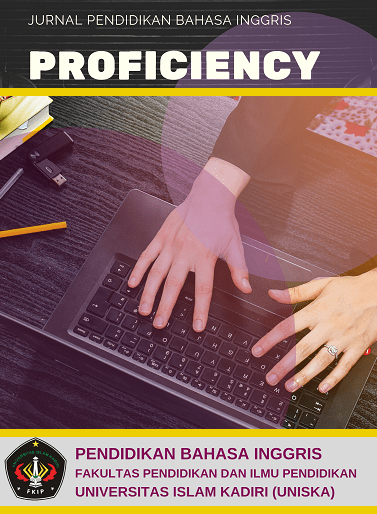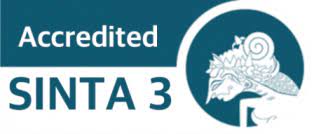USER EXPERIENCE OF LMS UNISKA AS AN E-LEARNING PLATFORM WITH THE TAM METHOD
Abstract
This study examines the user experience of the UNISKA LMS platform, implemented for blended learning at Kadiri Islamic University, utilizing the Technology Acceptance Model (TAM). The descriptive qualitative research, conducted with students and lecturers from the Department of English, collected data through observation, interviews, and documentation. Results show that the platform's perceived ease of use and usefulness significantly impact its acceptance. Users generally found the LMS beneficial for organizing study materials and enhancing engagement through multimedia integration. However, initial challenges included unfamiliarity with the system and technical issues like page maintenance problems and manual quiz input. Despite these issues, the platform facilitated a smooth transition from traditional to online learning environments, underscoring its potential to support modern educational practices. Improvements in system stability and feature simplicity are recommended to enhance user satisfaction and effectiveness. The findings contribute to understanding the practical application of LMS platforms in higher education, aligning with global trends in e-learning and ICT-based education models.
References
Alƨnpulluk, H., & Kesım, M. (2021). A systematic review of the tendencies in the use of learning management systems. Turkish Online Journal of Distance Education, 22(3), 40–54.
Andika Surya Listya Yudhana, & Wahyu Andhyka Kusuma. (2021). Kelebihan dan Kekurangan Learning Management System (LMS) Menggunkan Pendekatan Literature Review, dan User Persona. Jurnal Syntax Admiration, 2(9).
Chinapah, V., & Odero, J. O. (2016). Towards inclusive, quality ICT-based learning for rural transformation. Journal of Education and Research, 5(2/1), 107–125.
Dhika, H., Destiawati, F., Jaya, M., Barat, T., & Selatan, J.-J. (2020). Implementasi Learning Management System Dalam Media Pembelajaran Menggunakan Moodle. Prosiding Seminar Nasional Riset dan Information Science (SENARIS), 2, 228–234. https://www.apjii.or.id/survei
Fatmawati, I., & Sulisworo, D. (2021). Proï¬le of Implementing Google Classroom As A SMK Physics Learning Media. Jurnal Geliga Sains: Jurnal Pendidikan Fisika, 9(1), 12. https://doi.org/10.31258/jgs.9.1.12-18
Fearnley, M. R., & Amora, J. T. (2020). Learning Management System Adoption in Higher Education Using the Extended Technology Acceptance Model. IAFOR Journal of Education, 8(2), 89–106.
Hendra Dani Saputra, & Dedi Setiawan. (2021). Efektiï¬tas Media E-Learning
Terhadap Peningkatan Hasil Belajar. Jurnal Pegiat Literasi , 1(1), 41–48.
Joo, H. (2017). A Study on Understanding of UI and UX, and Understanding of Design According to User Interface Change. In International Journal of Applied Engineering Research (Vol. 12). http://www.ripublication.com
Maskar, S., & Sukma Dewi, P. (2021). Peningkatan Kompetensi Guru MA Darur Ridho Al-Irsyad Al Islamiyyah Pada Pembelajaran Daring Melalui Moodle. Journal Sosial Science and Technology for Community Service (JSSTCS), 2(1), 1–10. http://madarurridho.kelasdaring.net/.
Mulyani, W. (2013). Pengaruh pembelajaran berbasis e-learning terhadap hasil belajar siswa pada konsep impuls dan momentum.
Nento, F. (2023). Peran Teknologi dalam Dunia Pendidikan. E-Tech: Jurnal Ilmiah Teknologi Pendidikan, 11(1).
Oproiu, G. C. (2015a). A study about using e-learning platform (Moodle) in university teaching process. Procedia-Social and Behavioral Sciences, 180, 426–432.
Oproiu, G. C. (2015b). A Study about Using E-learning Platform (Moodle) in University Teaching Process. Procedia - Social and Behavioral Sciences, 180, 426–432. https://doi.org/10.1016/j.sbspro.2015.02.140
Ouadoud, M., Nejjari, A., Chkouri, M. Y., & El-Kadiri, K. E. (2018). Learning Management System and the Underlying Learning Theories. In Lecture Notes in Networks and Systems (Vol. 37, pp. 732–744). Springer. https://doi.org/10.1007/978-3-319-74500-8_67
Palandi, J. F., Aminah, S., & Pudyastuti, Z. E. (2017). Pengembangan aplikasi web e-learning untuk pendidikan anti korupsi menggunakan moodle. Jurnal Inovtek Polbeng, 2(2), 173–181.
Paudi, S. A., Takdir, R., & Kaluku, M. R. A. (2021). Penerapan Metode TAM Dalam Analisis E-Learning Pada SD Laboratorium UNG. Diffusion: Journal of Systems and Information Technology, 1(2), 131–141.
Paudi, S. A., Takdir, R., Kom, S., Cs, M., Ramdhan, M., Kaluku, A., & Kom, M. (2021).
Penerapan Metode TAM Dalam Analisis E-Learning Pada SD Laboratorium UNG (Vol. 1, Issue 2).
Quansah, R., & Essiam, C. (2021). The use of learning management system (LMS) moodle in the midst of covid-19 pandemic: Students’ perspective. Journal of Educational Technology and Online Learning, 4(3), 418–431. https://doi.org/10.31681/jetol.934730
Rahmawati, R., & Oktadini, N. R. (2024). Analisis User Experience Aplikasi McDonald’s Dengan Menggunakan Metode User Experience Questionnaire. Jurnal Fasilkom, 14(1), 26–33.
Rizal, S., Walidain, B., Pada, M., Pengantar, M., & Komputer, A. (2019). Pembuatan Media Pembelajaran E-Learning Berbasis Pembuatan Media Pembelajaran E-Learning Berbasis Moodle pada Matakuliah Pengantar Aplikasi Komputer Universitas Serambi Mekkah. In Universitas Serambi Mekkah Jurnal Ilmiah Didaktika Februari (Vol. 19, Issue 2). http://unllib.unl.edu/LPP/,
Setyaningsih, V. I., & Rahmawati, L. E. (2021). Student responses to online learning of Indonesian language subjects based on LMS Moodle. Jurnal Penelitian Ilmu Pendidikan, 14(2), 171–180.
Sima, V., Gheorghe, I. G., Subić, J., & Nancu, D. (2020). Influences of the industry 4.0 revolution on the human capital development and consumer behavior: A systemaƟc review. Sustainability, 12(10), 4035.
Waloyo, L. (2013). Perancangan e-learning dengan menggunakan Learning Management System (LMS). Widya Warta, 02, 332–341.
Wiwi Mulyani. (2013). Pengaruh Pembelajaran Berbasis E-Learning Terhadap Hasil Belajar Siswa Pada Konsep Impuls dan Momentum. UIN Syarif Hidayatullah Jakarta.
































